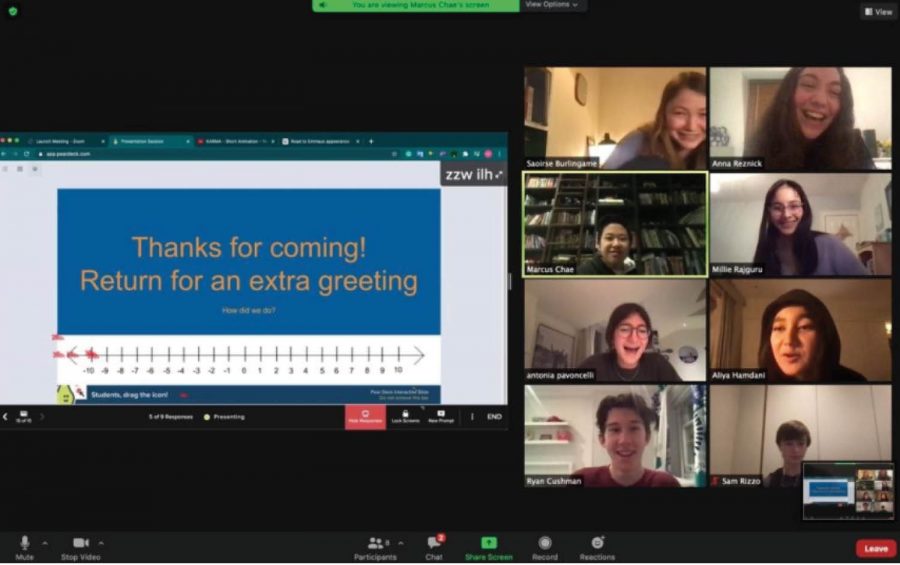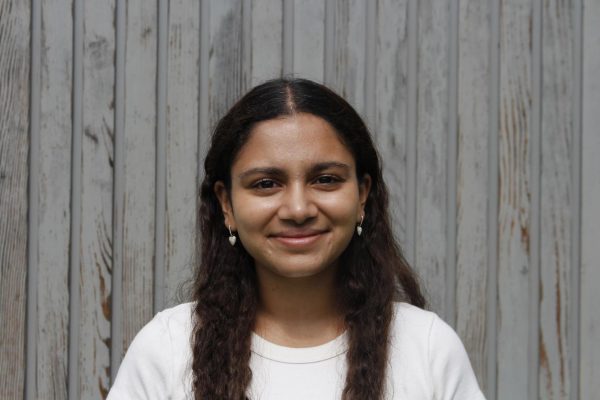Social Studies Teacher and faculty moderator of the Theology Club Lanting Xu said she recognized Grade 9 students enter World Civilizations I with less understanding of religions and their practices than the year before.
Co-leaders Saoirse Burlingame (’24) and Marcus Chae (’24) created the Theology Club to fill this gap in knowledge.
According to Barna, atheism has doubled between millennials and Generation Z. As Chae and Burlingame said they noticed this trend, they wanted to help students better understand religion and its place in the world.
Chae said he gained interest in religious studies at his old school. However, he said he did not find the same opportunity to discuss and learn about religion at ASL, and started the Theology Club as a result.
After Chae thought of the idea, he approached Burlingame to work together. They established the Theology Club a few weeks into the second semester, focusing on how they could “combine both their interests.”
Chae said club members decide on a guiding question every month and then look at how people of different religions perceive the phenomenon.
“We’re trying to answer these big questions from the viewpoints of many different religions,” he said. “This week we are looking at what happens after death, and we’ll be looking at how Catholics view it and how Protestants view it. We will carry on with this idea in the coming weeks with other religions as well.”
Because there’s less knowledge about religion, it’s hard for students to be tolerant. I think it’s more ignorance rather than choosing to be insensitive.
— Marcus Chae (’24)
Furthermore, Chae said questioning philosophy and ways of living can be extremely perplexing yet fascinating.
“Religion creates these big questions which are just slightly incomprehensible to humans,” he said.
Once members learn about different religious perspectives, the club hosts a debate and assigns different viewpoints to the members.
Burlingame, who is non-religious herself, said both religious and non-religious students are welcome to participate and would benefit from attending.
“Theology can be exclusive because if you’re not religious, why would you care about seeing what different religions would have to say about things like this?” she said. ”In fact, it can be very interesting.”
Similarly, Chae said students should recognize the importance of religion to members of the community regardless of whether or not they are affiliated with one.
“It’s important to remember that religion is a huge part of how lots of people think even if you’re not religious yourself,” he said. “We emphasize that you don’t have to be religious at all to be in this club.”
Likewise, Xu said topics surrounding human values and the purpose of life should not be limited to religious students.
We are a little more driven by the modern idea of success via grades or top colleges, instead of looking into the ancient wisdom of what makes life worth living.
— Social Studies Teacher and faculty moderator of the Theology Club Lanting Xu
“You don’t have to be religious in order to discuss these fundamental human concerns,” she said.
In addition, Burlingame said the club also incorporates important values and ideals by “looking at ethics and morality through the lens of religion.”
Xu said learning about religion can be a path for students to find their values, but she said doing so has become increasingly challenging.
“In a secular society, to actually identify an ethical core that would inform people’s behaviours and actions is difficult,” she said.
Xu said the ethical and moral aspects of religion correlate to the school’s Approaches to Learning and the ASL core values. However, she said they never discusses how this can positively affect the school community.
“Why do we take integrity as a significant aspect in student life, for example?” she said. “These are the things that we don’t tend to discuss. And yet, our community actually hosts a variety of religions and philosophies of life.”
In addition, Chae said he saw more defiance and less acceptance towards religion in the school community.
“Because there’s less knowledge about religion, it’s hard for students to be tolerant,” he said. “I think it’s more ignorance rather than choosing to be insensitive.”
Likewise, Burlingame said she noticed less religious understanding and attributed it to the fact that “it’s not really integrated that casually into the curriculum.”
Xu now teaches one of the few religion and ethics oriented classes in the High School, and said she notices a shift in students’ values and beliefs due to the lack of religious teaching.
“Because of the differences in our school curriculum, students are no longer discussing these ancient wisdoms to any depth,” she said. “We are a little more driven by the modern idea of success via grades or top colleges, instead of looking into the ancient wisdom of what makes life worth living.”
Chae said it is critical for all students to hold knowledge regarding religion in order to remain educated and cultivated.
“It’s important to preserve this idea of religion in an increasingly secular Western society because, although it’s becoming more secular here, it doesn’t mean all around the world people are losing their faith,” he said.
You get to make more choices about who you want to be in the world, and religion can actually be a big factor in that.
— Saoirse Burlingame (’24)
Furthermore, Xu said educating students in her World Civilizations class about religion alleviates religious misconceptions and helps them connect and understand each other better.
“I know for sure that our Muslim students really have expressed appreciation for the discussion on Islam,” she said. “If you only learn about Islam through mass media, then you’ll have a very skewed idea about this religion and miss the entire revolutionary aspect of this extraordinary religion.”
In addition, Burlingame said religious exposure can be beneficial for high school students to navigate what they align with.
“This is a time of growth and self-discovery,” she said. “You get to make more choices about who you want to be in the world, and religion can actually be a big factor in that.”
Particularly in the time of COVID-19, Xu said religious practices can be grounding and help to bind a community together.
“These kinds of ancient wisdoms really have a role to play in our contemporary world, especially during this pandemic where we see very clearly that our well being is all connected with each other,” she said.
Moreover, Xu said religion can rekindle selflessness.
“The absolutism in this idea of pursuit of personal freedom, often has a tremendous community cost.”
Furthermore, Xu said the rise of secularism and strong beliefs in science makes certain supernatural or unfathomable events seem unreasonable or impossible.
“We think that anything that cannot be proven through empirical science has to be false,” she said. “It is a dangerous way of thinking.”
Chae also said science has played a large role in “the decrease in religious beliefs” today.
Through her World Civilizations I class and the Theology Club, Xu said she hopes to encourage students to change their opinions on religion.
“In modern society, this is a major issue,” she said. “We think that anything that cannot be observed has no value anymore, and I’m hoping that a good ASL education could help students to see the problematic aspects of that way of thinking and therefore open them up to other possibilities.”
Xu said she is happy with the creation and growth of the club, and she wants other students to join, too.
“I’m really pleased to see how this club is going, and I’m hoping that more and more students are interested in these kinds of thoughtful discussions about life,” she said.






